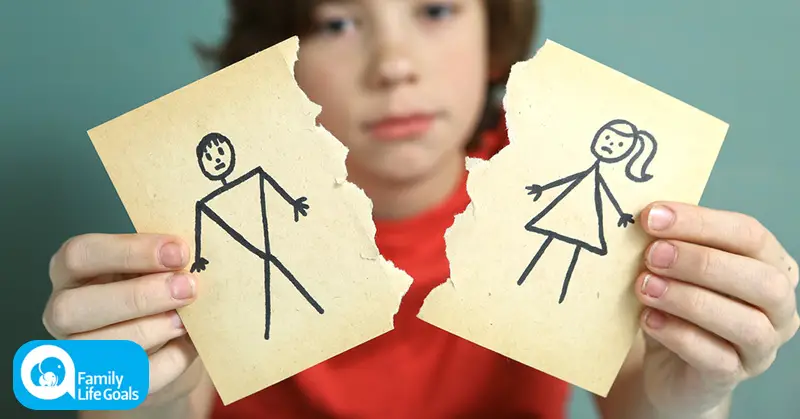You don’t want to split up your family and leave your kids feeling unstable or emotionally damaged from a divorce, so you and your partner decide to stay together and agree to split after the kids are out of the house. Sounds like a good idea, right? Not necessarily! Here’s why:
Divorce expert Gary Direnfeld, says:
“Not all separations are alike and not all parental separations spell disaster for their children. The social science research advises that the most salient factor determining risk for poor developmental outcomes for children of divorce is the level of conflict between their parents.” [1]

Psychological Effects of Staying Married ‘For The Kids’
Every relationship has disagreements, but the way you communicate with your partner is key. If there is a constant war zone going on it will adversely affect a child’s emotional growth. If staying married ‘for the kids’ means that they live in a turbulent, hostile environment, is that really for the best?
The residual effects on children living in high conflict homes include insecurity and low self-esteem. Being insecure makes it difficult to assert oneself in future relationships. Children feel safe and loved when conflict is reduced.[2] Sometimes this means opting for separation to remove the constant state of turmoil from the children’s life.
1. Relationship Expectations Become Skewed
Children imitate the adults around them. They use their parents’ relationship as a frame of reference for all of their relationships. Parents who choose to stay married, but have checked out of the relationship, are modeling the wrong behavior to their child. [2]
2. Children Pick up on More Than You Think
Don’t fool yourself into thinking that the kids will never know about your problems, so you may as well stay together. Kids hear the constant arguments and it makes them uncomfortable. It creates a chaotic and unstable environment to grow up in.[3]
3. Intact Families Can Be Broken Too
A child can live in a broken home, even without their parents separating. You are not sparing your child pain (or yourself) if you live with bickering and nastiness on a daily basis.
Children often blame themselves or other innocent parties for causing the arguments. They need to be reassured that adults are responsible for their own relationship, and are not at fault.[2]
4. Putting the Child In the Middle
Children feel awkward being placed in the middle of their parents’ arguments. They may feel pressured to take the side of one parent over the other.
Your anger and bitterness towards your spouse may be totally warranted, but bad-mouthing your partner to your child is not. Children love both of their parents, however, asking a child to side with one parent over the other is emotionally damaging to the child.[1,2]
Teaching Your Children Self-worth
What if you’ve tried to resolve issues with your partner, but it just isn’t working out? Remaining in a toxic relationship is not good for the adults and it doesn’t send a good message to children. Instead of settling for mediocre or worse, show children you value a good quality of life.[2]
Ending a failed marriage can lead to healing, growth, and empowerment. Your children will watch you thrive and grow. Find out the difference between healthy and toxic relationships.
Adult children often comment that they wished their parents had separated sooner, or wonder how life would have been if they had. Author, Joe DeProspero comments:
“Once they were no longer Mr. and Mrs., all of the unpleasantness went away. There was no awkwardness, no resentment. Amazingly, they got along quite well. It left me wondering if life would’ve been different had they cut the cord a decade or so sooner.”[3]
Alternatives to Divorce
Susan Pease Gadoua is a qualified therapist specializing in marriage and divorce. She is the author of the best-seller, Contemplating Divorce, A Step-by-Step Guide to Deciding Whether to Stay or Go and The Parenting Marriage Workbook: A Beginner’s Guide to Transitioning from a Traditional Marriage to a Parenting Marriage.
What is a “Parenting Marriage?” A parenting marriage differs from traditional love-based marriages in that the sole purpose is raising happy, well-adjusted children.[4]
Working on the concept that children need a stable loving environment, some couples choose to remain in the same household, perhaps with separate living quarters. Financially this is very practical for the adults. It gives children access to both parents, and there is less disruption to the child’s life. The child still has their neighborhood friends and school around them.[4]
Others decide to maintain separate residences within walking distance of one another so that their children can easily travel between both homes. [4]
Good Communication
In any case, there needs to be open and honest communication between parents to arrive at an agreement. Parents must keep a united front and convey the new arrangements to the children. Establish clear-cut boundaries covering when each parent is “on duty,” financial responsibilities, and dating protocol.[4]
Regardless of whether couples decide to stay together and work things out or separate, the way of co-parenting in either scenario is key. For the sake of the children, communication between both parties should be respectful and worthy of imitation by the child.
1. Gaspard, T., MSW, LICSW, et al (2015). The Way Parents Fight Affects Kids’ Self-Esteem (In All Kinds Of Families). Retrieved from https://www.huffingtonpost.com/terry-gaspard-msw-licsw/the-way-parents-fight-aff_b_7176576.html accessed August 29, 2018.
2. Reisch, R., et al (2017). 3 Things That Happen When You Stay Together “For The Kids.” Retrieved from https://iheartintelligence.com/2017/04/19/when-you-stay-together-for-the-kids/ accessed August 29, 2018.
3. DeProspero, J., et al (2014). The Problem With Staying Together For The Kids. Retrieved from https://www.huffingtonpost.com/joe-deprospero/the-unsaid-problem-with-staying-together-for-the-kids_b_6055010.html accessed August 29, 2018.
4. Pease Gadoua, S., et al (2016). Before You Divorce, Why Not Try a Parenting Marriage?. Retrieved from https://www.psychologytoday.com/ca/blog/contemplating-divorce/201601/you-divorce-why-not-try-parenting-marriage accessed August 29, 2018.

